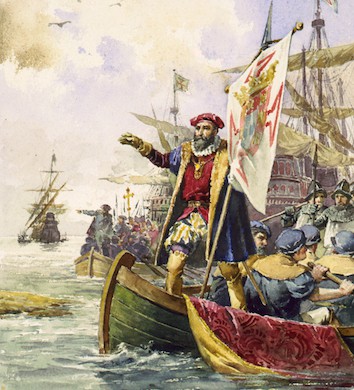Christopher Columbus, Marco Polo, James Cook: All famous explorers and discoverers of our time.
Though these men weren’t just explorers, they were networkers.
For decades, sailors attempted to reach India, with dozens of shipwrecks and thousands of deaths to prove it. Born in a sleepy fishing village on Portugal’s west coast, now-famed explorer Vasco Da Gama had a knack for the sailing life. After demonstrating a natural skill on the open sea, the king granted him 4 ships and set him off south.
The Portuguese Empire as we know it today would never had happened if not for this epic journey around the cape of Africa to Calicut, India. The relationships and trading routes Da Gama implemented as the first European to reach India by sea allowed for a Portuguese monopoly on the in-demand spices – resulting in decades of prosperity.
In today’s terms – we call this Business Development.
BD currently resides in its natural habitat of the commercial sector and is relatively under-utilised in the NFP space. However, as NFPs move further and further into the sustainability region they need to conquer this uncharted BD territory in order to survive.
Before we talk about what BD is exactly, lets make it clear what it’s not. It’s not sales. A good description is:
“Business development is the creation of long-term value for an organisation from markets, customers and relationships.” – Scott Pollack, ForbesWith new revenue streams will come markets and market segmentation. Before the exploration to India, Portugal was elbowing for trade-space in the crowded West African markets. Competition was stiff with several other European countries bustling for room and merchants comfortably hiking their prices. In India, Da Gama had found a sole supplier with previously unheard of products and essentially invented a market for himself. Business development is a key contributor to scoping potential new and innovative markets.In order to achieve sustainability, NFPs need to start creating customers around the assets they have at their disposal. To keep the expedition alive after losing 2 ships at sea, Da Gama had to think outside of the box. Upon reaching Mozambique, he impersonated a Muslim (fearing the local people may be hostile to Christians). This allowed him to trade what he had with the locals for essential supplies whilst informing them that this port would play a vital role in his future trade routes. He leveraged his existing assets and incentivised his customers to achieve his objectives. A key BD practice.Any successful business development effort relies on the foundation of very strong relationships. Building, nurturing and leveraging relationships with partners, customers, employees and beneficiaries is the ultimate form of long-term value creation. Da Gama sought audience and created trusting relationships with the decision makers at the key ports – all while being a foreigner in an unknown land. With these relationships in place, it enabled him to pull the right levers at the right time to ensure the trade routes could run smoothly.
Long–term value is essentially cash – but BD is not a get-rich-quick scheme. It is about creating opportunities for that value to persist over the long-term. Let’s look to our friend Da Gama one last time. Once reaching India he could have just stocked up as much pepper and cinnamon as possible and headed back to Lisbon to cash it in. But no, he was not so short-sighted. By establishing trade routes to keep the spices flowing he was able to fund Portugal’s entire colonisation campaign. For NFPs, these ‘trade routes’ come in the form of partnerships, sponsors and/or monetisation of products and services.
So embrace your inner Da Gama, build your fleet and set sail on the long journey towards sustainability.
In part 2 we get into the nitty-gritty with 3 realistic steps to implementing BD into your NFP organisation.
If you are interested in learning more about business strategy and sustainable business models
Download our Whitepaper on The Sustainable NFP


0 Comments